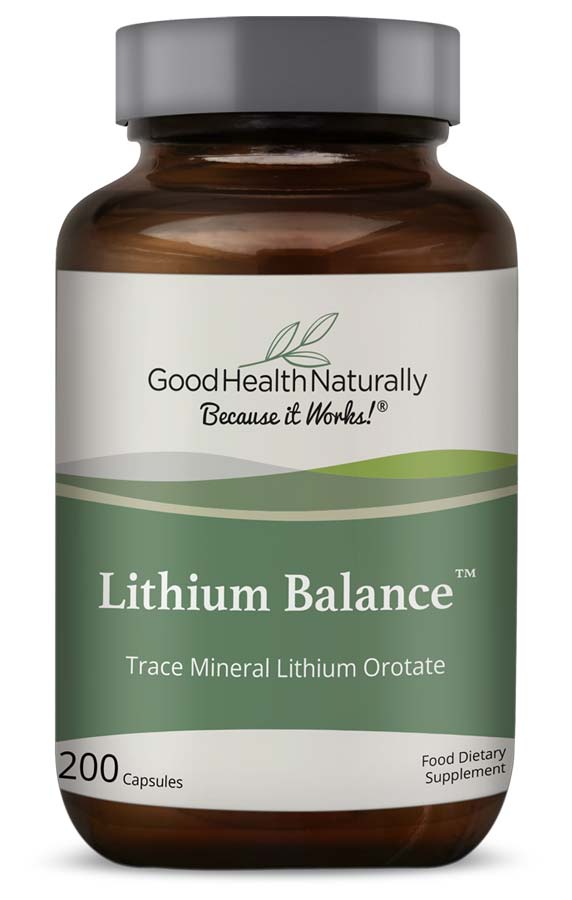A landmark 10-year study published in the Nature Journal has revealed that lithium, a trace element found naturally in the brain, may help protect against neurodegeneration. Researchers at Harvard Medical School have discovered that a decline in lithium levels is one of the earliest detectable changes in Alzheimer’s disease, even before symptoms appear. In ground-breaking mouse experiments, they found that small doses of lithium orotate could restore memory, decrease brain inflammation and even help neurons to regenerate.
What Is Lithium and Why Does the Brain Need It?
Although lithium is only needed in tiny quantities, it seems to play an important role in brain health. It may help protect neurons, regulate mood and support cognitive function as we age. It is a naturally occurring element found in trace amounts in drinking water and food.
Lithium carbonate is a well-known mood-stabilising compound, sometimes prescribed to treat bipolar disorder. Although the precise mechanism of action remains unclear, it is known to act on the central nervous system and help stabilise mood.
Scientists at Harvard Medical School tested different forms of lithium and used lithium orotate in most of their research.
Could Lithium Be the Missing Link in Alzheimer’s Disease?
For decades, Alzheimer’s research has focused on well-known hallmarks such as amyloid-beta plaques, tau tangles and the loss of protective brain proteins. Yet scientists have long puzzled over why some people with these abnormalities never develop dementia. It is now believed that lithium deficiency may be the missing link.https://goodhealthnaturally.com/?id=222&cp=11-01a
The Harvard team examined brain samples from people with Alzheimer’s, mild cognitive impairment and healthy controls. They tested for 30 different metals and found only lithium levels changed significantly. The highest levels were found in healthy people and the lowest in those with Alzheimer’s disease or early cognitive decline. In contrast, other metals such as iron, copper, and zinc showed no consistent changes.
These results were confirmed across multiple brain banks nationwide and align with previous population studies showing regions with higher lithium levels in drinking water tend to have lower dementia rates.
How Lithium Loss May Trigger Alzheimer’s Disease
The researchers found that the amyloid-beta plaques, the sticky protein clumps which build up in Alzheimer’s disease, may trap lithium, reducing the amount available in the brain. With less lithium available, neurons appear to lose their ability to communicate effectively, leading to inflammation and memory problems over time. This trapping effect could explain why lithium is depleted in people with the disease. With less lithium available, brain cells may struggle to maintain their protective functions, leading to inflammation and memory loss over time.
 Restoring Memory with Low-Dose Lithium Orotate
Restoring Memory with Low-Dose Lithium Orotate
In ground-breaking mouse experiments, researchers tested different forms of lithium to see if any could avoid being trapped by amyloid plaques. They discovered lithium orotate performed far better than the commonly prescribed form, lithium carbonate.
When mice with Alzheimer’s disease were given lithium orotate, their memory improved, brain inflammation decreased, and neurons began to regenerate.
To explore this further, scientists placed mice on a lithium-deficient diet to mimic the low levels seen in Alzheimer’s. These mice showed faster brain ageing, more inflammation and poorer memory. But when they were given lithium orotate, the damage was reversed, even in older mice with advanced disease.
It also seemed to influence genes linked to Alzheimer’s risk, such as APOE. Even more remarkably, they discovered that maintaining normal lithium levels from early life prevented Alzheimer-like symptoms from developing at all.
A Safer Way to Use Lithium
Until now, there have been a few limited clinical trials of lithium for Alzheimer’s disease, but the lithium compounds which were used were lithium carbonate, which can be toxic to ageing people at the high therapeutic doses normally used clinically. The breakthrough here is that the Harvard team found lithium orotate was effective at one-thousandth of the dose, and seemed to be enough to mimic the natural level of lithium in the brain. Mice treated for nearly their entire adult lives showed no evidence of toxicity.
Natural Lithium Levels and Cognitive Resilience
Research shows that lithium levels in the brain naturally decline with age, even in people without Alzheimer’s. Harvard researchers found that older adults with higher lithium levels performed better on memory and problem-solving tasks. This suggests that lithium plays a vital role in cognitive resilience, the brain’s ability to stay sharp and adapt as we age.
In simple terms, small amounts of lithium may act like a nutrient for the brain, helping maintain focus, memory, and mental flexibility over time.
Future Research and Clinical Trials
While these findings are hugely promising, researchers urge caution. Alzheimer’s disease likely has multiple causes, and declining lithium could be one piece of the complex puzzle. However, the discovery that lithium levels drop in the brain during the progression of Alzheimer’s disease opens up possibilities for prevention and even treatment.
More clinical trials in humans are needed to confirm the safety and effectiveness of lithium orotate. But the implications are enormous. Measuring lithium levels through routine blood tests could even become a new marker for early detection.
Key Points
- People with Alzheimer’s disease exhibit significantly lower levels of lithium in a brain region predominantly affected by Alzheimer’s disease.
- In ageing people without Alzheimer’s disease, brain lithium levels correlate with cognitive test scores assessing working memory.
- Treatment with a low dose of lithium orotate restored memory in a mouse model of Alzheimer’s disease.
https://www.nature.com/articles/s41586-025-09335-x
https://pubmed.ncbi.nlm.nih.gov/28832877/




